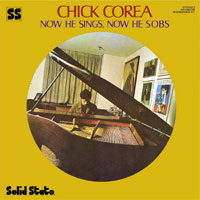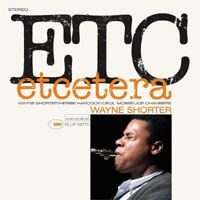Chick Corea • Now He Sings, Now He Sobs
Wayne Shorter • Etcetera
icking up first-day copies of every new Charles Lloyd album and flyspecking liner notes for recording and mastering information are among my compulsions. As a result, I noticed that Lloyd’s acknowledgement of Joe Harley’s contributions changed in 2016, from listing Harley as a "sound consultant" on 2015’s Wild Man Dance [Blue Note B002243401] to the more prosaic "tone poet" designation on each of Lloyd’s three subsequent releases. Anthony Wilson picked up the inside joke and started making the same affirmation of Harley's involvement on his LPs for the Groove Note label. As anyone knows who has sampled any of the marvelous reissues of classic Blue Note titles on the Music Matters label that he co-founded with Ron Rambach in 2007, Harley is one of the most accomplished archeologists of our jazz heritage. Back in the 1990s, he first made his mark in record production with AudioQuest Music, releasing a series of mostly blues albums. In addition to AudioQuest and Music Matters, he works directly with individual artists such as Charles Lloyd, several artists on Groove Note Records, and graduates of the AudioQuest label who have moved on to other labels. He was also one of the guiding forces behind the release of twenty classic Blue Note titles on XRCD24 from Audio Wave. Thus it was exciting news when Harley tipped me off last year that he was working on new releases with Blue Note president Don Was to be called the Tone Poet Audiophile Vinyl Reissue Series. This consists of titles that Harley selected and features classics from the Blue Note catalogue and its associated labels. Of the 18 titles set for release in 2019, I recognize only one (Gil Evans’ New Bottle Old Wine) that has been reissued by an audiophile label. The first two releases in the Tone Poet series are examples of lesser-known releases from the Blue Note family. Wayne Shorter’s Etcetera should, by all but one standard, be a very well known title. The reason it's underappreciated is that this 1965 recording was held back for fifteen years, first released after the Blue Note label had been taken over first by Liberty Records and then purchased by United Artists Records. There are several reasons why few collectors get excited about finding United Artists’ pressings of Blue Note records. The main reason is that United Artists managed to suck the life out of the recordings, somehow creating insipid tone quality. Reversing that wrong is the goal of the Tone Poet series and proves that one man's loss is another man’s gain. The formula is to take a well-recorded title by a great ensemble that sounds at best average in its original incarnation, throw in careful mastering from Kevin Gray of Cohearent Audio, impeccable cover reconstruction, great pressings from RTI and stir in a little Tone Poetry. Blue Note has selected titles that sell for $5 in bargain bins (but sound boring) and transformed them into $35 sonic gems. The formula has worked beyond Blue Note’s wildest dreams, with the initial releases selling like hotcakes. Etcetera features a phenomenal band: Herbie Hancock on piano, Cecil McBee on bass and Joe Chambers on drums supporting Wayne Shorter's tenor-sax explorations. The session was recorded on June 14, 1965 at Rudy Van Gelder’s Englewood Cliffs recording studio. In other words, Etcetera was recorded in the middle of Shorter’s prime -- JuJu and The All-Seeing Eye were released the same year, and Adam’s Apple and Speak No Evil the following year. Perhaps it was this fecundity that convinced Alfred Lion and Francis Wolff to shelve the Etcetera tapes. We’ll never know for sure, but there’s certainly nothing about the performance to suggest why the LP did not see a contemporaneous issue. Consisting of four Wayne Shorter compositions and a Gil Evans cover, the entire session is captivating. "Penelope" is, as Michael Cuscuna says in the liner notes, a "spare and meditative" ballad, with Shorter showing off his strong debt to John Coltrane. The album closes on "Indian Song," a near-perfect example of Shorter’s composing chops and the band members’ intuitive anticipation of each other. As with so many United Artists Blue Note releases, the original LP sounded bleached and was lacking in dynamics. Joe Harley and Kevin Gray have unearthed what ranks among the best-sounding Blue Notes of the 1960s. No fake stereo soundstaging here. The musicians are spread out in a convincing space, and the balance among the players is near ideal. Tonally, the LP is leaps and bounds ahead of the original, and unlike some Blue Note sessions, the piano is well recorded. Chick Corea’s Now He Sings, Now He Sobs follows the same formula. The Solid State label appeared in 1966 and released a few dozen records before being absorbed into the United Artists Blue Note group. Corea is supported by a great cast, with Miroslav Vitouš on bass and Roy Haynes on drums. Vitouš, perhaps best known as one of the founding members of Weather Report, was just breaking big in 1968 when this album was recorded, working as a sideman with Roy Ayers, Chick Corea and Herbie Mann. Haynes, one of the greatest drummers of all time, was and is phenomenal in any style of jazz, and he had great impact on rock drummers. By 1968, he’d been around for about twenty years. The music, a set of improvisations composed by Corea, is some of the most audacious of his career -- and indeed in jazz history. Limited as he was to three players, Corea left himself plenty of space to explore and run wild with his creativity, and Haynes and Vitouš were perfectly suited to match his energy and intent. Corea and his confederates play a game of pace and space. An extremely fast-moving pace is maintained while spreading out the space around the musicians under tightly controlled yet expertly choreographed conditions. Now She Sings, Now He Sobs provides one of those listening experiences without which your grasp of the jazz idiom feels incomplete. Don Hahn at Phil Ramone’s A&R Studios in New York recorded the session, which, while not reaching the heights of that studio's very best work, is still fairly well done. The original pressing (like every original Solid State LP I’ve ever heard) was underwhelming, with disappointing piano tone. Joe Harley and Kevin Gray have again restored life to the recording, with tonal purity lacking from the original. The LP does not create an entirely convincing soundscape or have the ideal instrumental balance of the Shorter release, but it is still far ahead of the original. Oddly enough, this slight shortcoming disappears when listening through headphones, where the spatial balance sounds just right. The Tone Poet series promises much and delivers more, with much to look forward to in
the coming year. If you are one of those record buyers who bemoans the fact that a handful
of titles are reissued over and over again, put your money where your mouth is and
don’t miss these. |


